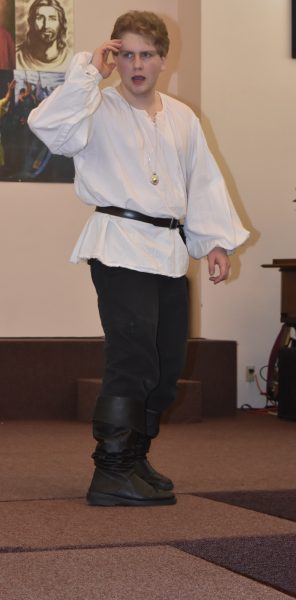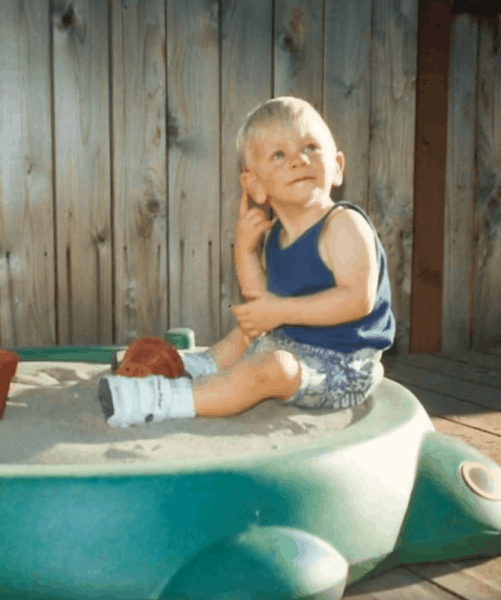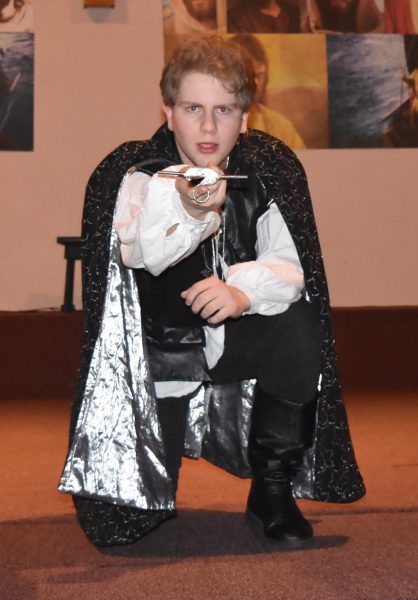David A. was born with bilateral deafness from Type I Usher syndrome. In trying to find a solution for him, David’s parents took a leap of faith 20 years ago, deciding to move forward with a cochlear implant, which was newer technology and the benefits not as well known at the time. Read how the decision David’s parents made for him to hear changed his life, helping him to succeed in school, live and travel independently and perform as a lead for multiple Shakespeare productions:
“I was a perfect child for five months. Then it all went wrong.
Of course, it was not my fault. I had no idea that there was any such thing as noise, sound, music or speech. My mom and dad found out I was deaf when on the Willamette waterfront; the Portland Spirit cruise ship blew its horn to depart, and I did not so much as blink. That is when we, as a young family, were thrown into a much stranger world, a much more hostile world, with only two potentially life-altering choices. Do we embrace deafness or conquer it?
My parents had the right to remain silent; instead, they chose the still somewhat unfamiliar technology of a cochlear implant in 1998. During this time, the technology still felt highly ‘experimental’ to them and even to most of the professionals they spoke to. ‘Do not get your hopes up,’ they were warned. ‘He might not get much out of it.’
Success in school and theater
Boy were they wrong. For 20 years, my Cochlear Implant has been a blessing for our family. People said ‘He will not learn or read well, or speak clearly,’ but I was reading by age 3 and two grades ahead in math for most of elementary and middle school. I was even cast in the lead roles of Shakespeare’s ‘Macbeth’ and ‘Hamlet’ by the time I was 19. How did this happen?
Type I Usher syndrome (a genetic-recessive disorder) is the culprit of my bilateral deafness. My doctors in Portland, Oregon were the catalysts for mentoring and encouraging my parents to make these drastic decisions for me at such an early, impressionable age.
On my right side, I was implanted at 18 months, and my left was implanted when I was 7. I currently benefit mostly from my right side, utilizing the Nucleus® 6 Sound Processor. I have been able to benefit from several technology upgrades and have previously used the Nucleus 5, the Freedom, the Esprit 3G and a much older version sound processor.
Fast-forward to today
 Today, I am a sophomore at Portland Community College, with my eyes set on a mathematics or accounting degree and my implant is my superhero. Never once in my two years at college has a professor been told that I was deaf (except when I presented on the topic in Communications 101), because they simply did not need to know; I could hear them very well.
Today, I am a sophomore at Portland Community College, with my eyes set on a mathematics or accounting degree and my implant is my superhero. Never once in my two years at college has a professor been told that I was deaf (except when I presented on the topic in Communications 101), because they simply did not need to know; I could hear them very well.
There are limitations to my hearing. My hearing is not as effective in extremely noisy environments or an open forum discussion setting, since I have difficulty singling in on a specific voice above the others. However, when speaking one-on-one, or listening to a lecture or an audiobook, I am perfectly in my element. When I need some quiet time to focus on an assignment, I have a superpower no one else has—the ability to dwell in utter silence if I so choose.
As the miracle of cochlear implants has taught me, sound is a wonderful thing. Do not hold back.
It is not just school that has been positively affected by my hearing miracle, it permeates every area of my life. For four years between 2014 and 2017, I participated in no less than six Shakespeare plays for young adults. Twice I was cast as the headliner—Lord Macbeth and Prince Hamlet. Such opportunities would have been hard for a deaf individual outside of a specialized community production.
I have traveled across the country entirely alone three times: once to Colorado, once to Tennessee, and once to North Carolina for two to six weeks at a time. Between planes, trains, Greyhound buses and taxicabs, I was responsible for my own safety and transportation. My father said he would likely never have allowed this if I were not able to hear. Instead, not only have I become independent, but also on two of those occasions, I served as a counselor for a massive worldview camp called Summit, and I was in part responsible for the coordination of a two-week conference. It would not have been possible for me to do if I could not hear.
Words of encouragement
From here, the path is cloudy, but at least it is not silent. I aim for a bachelor’s degree from Portland State within the next few years, I want to start and raise a family, to become a published fiction author and even possibly to work as a stage actor. Because it is possible.
If I were to give one word of encouragement, I would give it to parents of deaf children, and that is this: your child can excel with a cochlear implant. You do not have to learn sign language if that is too intimidating for you. I am living, breathing proof that great things are possible.
It has not been an easy road by any means. However, I have made it this far. My little brother Tyler is now 7, also bilaterally implanted, and soaring past any records I ever set as a child. Watching him follow in and even outgrow my footsteps is one of the happiest things for me to see. As the miracle of cochlear implants has taught me, sound is a wonderful thing. Do not hold back.”

